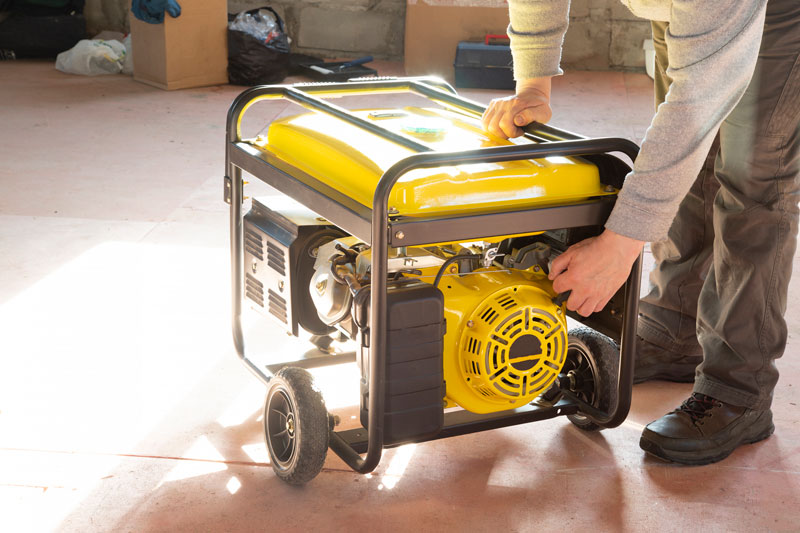It’s a rare fall (or spring) when Coloradans don’t lose power. Heavy, wet fall and spring snowstorms wreak havoc on overhead power lines, from falling branches or simply their own weight. Many locals choose gasoline-powered portable generators to get them through the occasional weather woes, and those are often good choices—when used and maintained properly. If they’re not, they fail to run or even become threats to both property and life.
Here's a look at the pros and cons of portable generators:
The Pros of Portable Generators
Portable generators are easy to use and easy to store. A quick trip to the garage or shed and they’re ready to provide emergency power during a blackout.
A larger portable generator will give you enough power to run most things in your house like lighting, a refrigerator, and a gas furnace. Electric heat draws a lot of current, so smaller units may not be up to the task, but even smaller units made for RV and recreational use can keep essentials like a few lights and a refrigerator going…at least until they run out of fuel.
The Cons of Portable Generators
Unless it’s wired into your household circuitry (which is dangerous and should only be done by a licensed electrician), you’ll have to run extension cords to power your lights and appliances. At minimum, this presents tripping hazards, especially in areas with poor lighting. Pets, rodents, and small children, often find electrical cords irresistible, too.
The cords themselves need to be rated for the load they will carry. Otherwise, damage, shock, and fire present serious dangers. And because they burn fossil fuels, the risk of fire, explosion, and carbon monoxide poisoning are a hazard when using portable generators.
Finding the Right Generator for You
A well maintained and properly operated portable generator can get you through short outages safely. Newer generators add features like inverters for noise reduction, automatic shutoffs for malfunctions, and low carbon monoxide engines to add convenience and safety.
Like beauty, portability is in the eye of the beholder. Generators range in size from small 40-50 pound 2500 watt machines to 8000-watt generators weighing around 200 pounds that put out enough power to run most appliances and lights for up to 18 hours before refueling. Researching portable generators on the internet is a good place to refine your options and choices.
Maintaining Your Portable Generator
Portable generators can sit idle for months, even years, so maintenance is crucial to have yours ready when it’s needed. Here are a few simple ways to keep your generator ready to run.
- Keep the fuel tank empty
Just like lawnmowers and other gas-powered tools, generator fuel tanks should be run to empty before shutting down for an extended time to avoid clogged fuel lines and engines. - Keep fuel handy and safe
Keep fresh fuel handy and store it safely away from heat and combustion sources in 5-gallon cans approved by ASTM International for long-term storage. - Test run the generator periodically
Don’t leave a new generator in the box until you need it. This is especially important if bad weather is imminent. Set it up, familiarize yourself with its operation, and give it a test run with about a pint of gas. Then repeat the test at least a couple of times a year to be sure it’s in good operating condition and replace or repair any parts as needed. If your generator has electronic ignition, be sure the battery is fully charged.
And always run the generator outdoors, away from any area where fumes can accumulate. Generator exhaust can incapacitate or kill within five minutes in a confined space.
Portable generators can be a good solution for occasional power outages. If you live in an area where outages are frequent or fuel is hard to come by, you may want to consider other options like a home standby generator. You can see all your emergency power generator options in this article on the Allstar Electrical website.
Stay Safe with Professional Help
Choosing the right generator and using it safely requires a knowledge of electrical circuitry and codes. Don’t risk injury, shock, fire hazards, or expensive repairs by getting in over your head.
If you’re thinking about adding safe, reliable backup power or have any problems or concerns about your electrical service, the pros at Allstar Electrical Services are ready to help. We offer homeowners, builders, and businesses reliable, professional electrical work that is safe and up to code.
Call Allstar Electrical at 303.399.7420 or visit our website. We’ve served Colorado’s Front Range for over 20 years, are top-rated by the BBB and are proud to be an Angi’s Home Advisor certified contractor.

